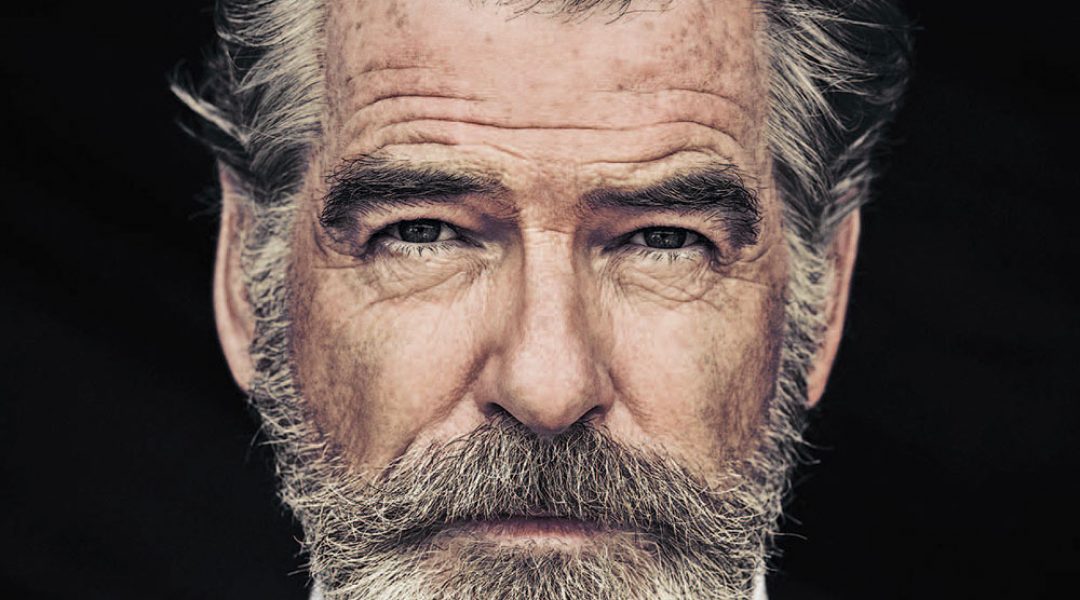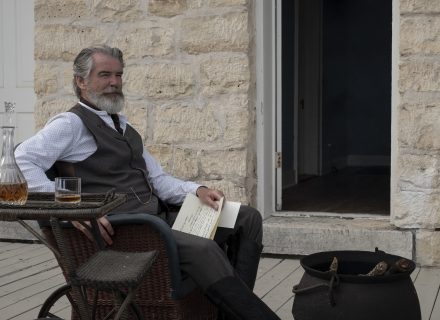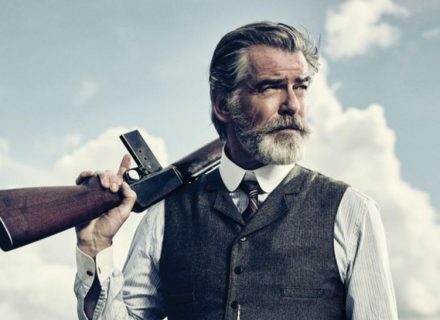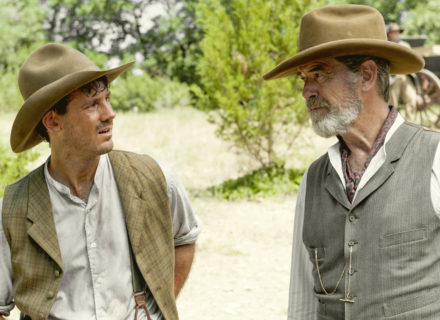Even now, after months of collaboration with Pierce Brosnan on location in and around Austin, Texas, Philipp Meyer — author of The Son and executive producer/co-creator of the new AMC series — sounds very much like a man who cannot believe his good fortune.
For the character Eli McCullough, Meyer knew he would require an actor who could do intimate intensity in one scene, play hearty bonhomie in the next, and then turn on a dime to Old Testament fury. He wanted someone charismatic and accomplished. But given the tight schedules endemic to series television, he knew he had to have a dedicated team player.
Fortunately, Meyer got just what he needed. “It’s an extraordinary pleasure,” he says, “to be working with someone like Pierce who’s insanely famous — and also a very modest human being.
“You know, that’s what everyone wonders anytime a big star is hired for any project: How hard are they going to work? Like, Marlon Brando, toward the end of his career, was said to be a disaster in that regard. But Pierce? He just comes in, he works so hard, and he prepares so hard. He’s [bleeping] amazing.”
For his own part, Brosnan sounds equally grateful for The Son. Mind you, the Irish-born veteran actor has accumulated a prodigious list of credits that include four stints as James Bond in the 007 movie series, the title role in the enduringly popular Remington Steele TV series, and memorable performances in The Thomas Crown Affair, Seraphim Falls, The Matador, Mrs. Doubtfire, The Ghost Writer, and Mamma Mia! But to hear him talk, The Son came along at just the right time — with an irresistible lead character to portray.
Cowboys & Indians: You’ve been away from weekly television for nearly three decades, since the end of Remington Steele. What was it about The Son that made you want to return?
Pierce Brosnan: Basically, the work itself. The writing by Philipp Meyer, and the scripts that were sent to me that came out of left field. I had a movie that fell apart, which is not unusual, and I said to my agents, “Look, I want to work.” The next day these five episodes, the first five episodes, came in. So I sat down one day and I read them. They just enthralled me ... I sat with the producers the next day at [my agent’s] office, and they talked me through it — and I said yes, and the deal was done by the end of the week. So it was the writing — and the character, and the scope of the thing. I had been searching with my late and dear friend Beau Marie St. Clair — we had formed a production company called Irish DreamTime — and we had been actively looking for a TV series. See, in this golden age of TV, you go where the work is. And right now, the best work is on TV.
C&I: How did you get inside the mind of Eli McCullough?
Brosnan: Again, I read the scripts, and the book. You know, you get a lot from the script if you follow the chords, the beats. As for the particulars of the man — well, I’m a father, and I’ve lived a fair bit of life as a man, as an actor, as a father. I’ve had my losses in life, so you draw on all of that. I know something of the world — not particularly the world of 1915, but you read the scripts, and the rest is your imagination. You bring it home to yourself. You let your own self be the character. And then, I don’t know, you step onto the set and something happens. You begin to move in a different way. I mean, this man would strap on a gun every day of his life.
C&I: And he knew he might have to use it every day of his life.
Brosnan: That’s right. You have a weapon strapped to your side. Eli’s entire life is violence. And he was the last man standing too many times to count. His life has been surrounded by war. He also knows that you cannot just wish violence away, you have to control it. If you feel there is going to be a fight, you throw the first punch. If there’s going to be a war, you don’t leave any survivors. So, he’s a brutal character. But he also loves people. He loves mankind. But he was just born in that era, you know? Born into a lifetime of war.
C&I: At the same time, though, he’s not so bound by the past that he can’t see the future. Early in the first episode, he states that the age of the cattle baron is over — and in order to survive, he must drill for oil.
Brosnan: Yeah. And he does. If there’s anything that defines Eli, it’s a kind of flexibility in how he deals with the world and a total lack of sentimentality. He is a forward-thinking man. He’s a man who’s constantly pushing himself, and still learning. And his mind is open to the world. Or at least he hopes it is.
The old days, did he like them better? You know, those days when there were no fences around, and there was lots of game, and you could run a hundred miles without seeing a man’s footprint. He loved those times. Of course he did. He knows that he was lucky to have seen those days, and he feels a sorrow for those who didn’t.
But he knows those days are not coming back, and he’s not a man to waste time and energy on bullshit.
C&I: Would you say that, after all he has experienced, from losing his family at an early age to facing and perpetrating so much violence in his lifetime, Eli has made himself immune to fear?
Brosnan: Oh, I would say he still has fears. But, as I say, it’s born out of a lifetime of war. And probably he fears that he will outlive everyone that he loves. He’s already seen family members decimated by war. And in some ways, this keeps him from connecting with people around him. Even his family. Especially his family. Because he’s seen his family just torn apart.
C&I: I still remember something you told me several years ago, right before the release of GoldenEye, your first 007 movie. You were describing the various aspects of James Bond’s character and, out of the blue, you said, “You know, of course, that James Bond lost his wife.” ... This was not so long after you’d lost your first wife, Cassandra Harris, to cancer. Bond’s being a widower is never emphasized in GoldenEye itself. But it obviously was something you had in common, and you drew upon that. What would you say you’ve drawn from your life to better understand Eli?
Brosnan: Oh, you know, a few things. Like having a fractured life, a life where one is without a father. Where one is moved about within the circle of a family. I could identify with that feeling of survival, and being the listener, the observer. Being an only child within a strict Catholic community in the ’50s. The loss of a wife and a daughter has deep significance to the underpinning of Eli McCullough. And the Scots-Irish heritage of such a man. There are certain emblems there that were kind of obvious to my own emotional resonance. ... I know what it’s like to be the outsider coming from Ireland in ’64 as a young boy to the shores of England. A new life, a new beginning — and the prejudice that I encountered as an 11-year-old boy.
C&I: Much has been said and written about the chronic sadness or melancholy of the Irish — often described as the “Black Irish” mood. Do you put much stock in that?
Brosnan: I think it’s fairly evident in the writings of the great ones like Joyce and Yeats — the lyricism and the poetry and the deep connection to the people and the land. I don’t know what it is about Irish, and the Black Irish, and all the melancholia of the Irish spirit. But it also has incredible essence and vigor, and a life force for joviality and spirituality and fun and excitement. All of which just helps you draw on some hopefully positive, spiritual aspect in getting through life.
C&I: Back to The Son. Were there any real technical challenges to playing Eli?
Brosnan: I listened for the accent of various people. [Texas Rep.] Ted Poe was someone — I just enjoyed listening to his voice. But really, I had no obstacles in that regard. The technicality of the accent is one thing I had to just make peace with, because no one really knows what the men and women of the day of 1915 or thereabouts sounded like, particularly from that neck of the woods. But once I made peace with that emotionally, I had a very strong connection to the man. Being Irish, living a rural life as a young boy, living a country life certainly colored my ways and how one addresses people. So I can’t think of anything specifically that I could truthfully say was a hard nut to crack. [Laughs.] Besides, as I said, the job came out of left field so quickly at me, I didn’t have time to dwell on such obstacles.
C&I: Except for Seraphim Falls, you don’t have any westerns on your résumé. But you certainly look like you’re at ease on horseback in The Son.
Brosnan: I do like riding, I do. I enjoy horses very much. On The Son, I was fortunate to have good horses — one more sure-footed than the other. But, yeah, riding horses is great fun. And riding in the company of great wranglers and cowboys is even greater. We had some of the finest men there on the show.
C&I: Eli McCullough walks into a room, and he immediately commands attention and deference — maybe even awe. After all your years as an international star, did you find it easy to project that vibe?
Brosnan: [Laughs.] Oh good God, no. Please don’t even talk of awe. I’m just an actor. I go to the set, and on my first day of work, I’m just as nervous and terrified and scared as any young 20-year-old who’s walking out there. Because I care. Because I want to do well. And because I know I have an audience that I want to do well for. Whatever the performance is, it’s for the audience, it’s for the people that you do the work. I mean, for yourself, it’s just so thrilling to be an actor, to live an actor’s life, to get to travel. Of course, I’ve noticed that the camera operator looks like he’s 25 — and he’s probably 32. Yes, you do feel your years. I’m 63 now.
C&I: But wouldn’t you say part of that alchemy when you’re working with younger actors is — well, OK, maybe they’re not in awe of you. But it certainly doesn’t hurt the scene, or the story as a whole, if they treat you with some degree of deference.
Brosnan: No, I can relate to that, I know what it’s like to be 24 and to be in the company of Tennessee Williams, or great British actors like Frank Finlay or Colin Blakely. But I’m in awe of the young people as well. I was in awe of Sydney Lucas, who plays my granddaughter. Just to be opposite her was magic, sheer heaven. And when you’re opposite really fine actors like Sydney or David Wilson Barnes or Henry Garrett or Jess Weixler — all the people in this cast just made me feel great and believe in myself just a little bit more. So it became an ensemble, and we became a very strong company. Everybody’s commitment to the work was 100 percent every day.
C&I: Finally, looking back: How does it feel to have been part of the James Bond mythos? Not so much playing the role in certain films, but being part of a legend, something larger than life — as you would be if you played someone like Sherlock Holmes, or even Tarzan.
Brosnan: I relate to it strongly as a man of certain years, and having traveled down the road a fair bit. And I have great gratitude for being part of such a mythos. Truly so, truly. It seems to have been my destiny one way or another to have played that role. And I’m very proud of the four films I made. I have a deep pride in the work done. I came into [the Bond series] at a time when it had been dormant for six years, and there seemed to be little faith in James Bond ever coming back to the world stage again. So having been part of that rebirth is one thing that I am humbly proud of.
C&I: And now here you are, at the birth of The Son.
Brosnan: You know, you just want to look around at day’s end and find a little handful of films — I mean, you’d love to have an armful, but even just a pocketful of films where you can say, “That was me, and that was him. And we came together, and we made something that is memorable.”
Tune in to AMC for the April 8 premiere. And stay tuned for further developments.
From the April 2017 issue.
















